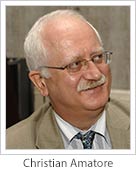Gather with your colleagues
The Plenary session is one of the highlighted events of the meeting, allowing participants from every symposia to come together and recognize some of the greatest minds in the field.
ECS President Dan Scherson will wrap up the first full day of the 229th Meeting by welcoming the ECS meeting attendees and introducing the highly anticipated ECS lecturer, Christian Amatore and his talk “Seeing, Measuring and Understanding Vesicular Exocytosis of Neurotransmitters.”
The agenda also includes:
- Henry B. Linford Award for Distinguished Teaching will be presented to John Scully
- Vittorio de Nora Award will be presented to Ralph White for contributions to the field of electrochemical engineering and technology.
Be sure to add the Society and Division and Section award winners talks to your meeting scheduler, they are in various symposia throughout the week.
 ECS Lecture
ECS Lecture
1700h | Monday, May 30
Sapphire Ballroom BC
Seeing, Measuring and Understanding Vesicular Exocytosis of Neurotransmitters by Christian Amatore
Christian Amatore gave molecular electrochemistry new direction by utilizing new concepts and tools to allow the discipline to overflow its traditional fields in order to face major problems in organic and inorganic chemistry, organometallic, and even biology. Amatore has had a pioneering role in the development of ultramicroelectrodes worldwide.
His research involved the development of advanced electrochemical methods for investigating extremely complex mechanisms of organic and organometallic chemistry under the very conditions used by synthetic chemists as well as for the study of important biological mechanisms at the single cell level. Amatore’s activity in molecular kinetics is best illustrated by the rationalization of electron transfer catalysis, electron transfer activation of molecules and more recently by a thorough series of works relative to the elucidation of the most important mechanistic aspects of catalysis by homogeneous palladium complexes, an extremely active area in today’s catalysis for carbon-carbon bond making in fine chemical industry.
Amatore has received many honors and awards in the scientific community, including CNRS’s Silver Medal, SEAC’s Reilley Award, and RSC’s Bourke Medal.
Five questions for Christian Amatore
What types of practical applications does your work in microelectrodes have?
Let me tell you a story. Michael Faraday was visited by the Prime Minister of England in his own laboratory, and he demonstrated the classical experiment where you take a magnet and you put the iron filing and you see that the iron filling is emitting lines that are going out of the magnet from the North Pole to the South Pole. The Prime Minster said, “Professor Faraday, this is fantastic. What are the applications?” Faraday said, “Mr. Prime Minister, I don’t know of any applications, but I am sure within 30 years there will be applications done by other people.” In fact, he was a visionary because 30 years after you had the first electrical engine and the first big alternators to make electricity. It’s very difficult to foresee the applications because as scientists, we are interested in understanding what’s going on and it is generally other people who will find the applications.
What do you think the impact of electrochemistry is on some of the world’s most pressing issues?
The energy problem is one problem that only electrochemistry can solve. When you want to make a fuel cell, you have to understand the electrochemistry. When you want to make a supercapacitor or sodium ion batteries, you need to understand electrochemistry. If we want to convert and store the energy, speaking about photovoltaics or windmills, this type of energy is intermittent. If we want to use this energy, we need to have a way to store the electricity. What most people don’t understand is that electricity is like a river. If you store the energy carried by the river flow you need to make a dam, and a dam in electrochemistry is called a battery.
What fuels your passion for science?
Science is a marvelous adventure. The need for understanding the world around us is one of the most ancient arts of humanity. I think the human brain has a need for understanding. I could not live in a world where there is no art and where there is no science.
Tell us about your experience with the French High Council for Science and Technology.
I was one of two chemists. When the government had some need for advice, they asked us to produce that advice that was for the better management of some issue in research. That was a fantastic experience in my life.
What areas does electrochemical science and technology impact?
Electrochemistry is everywhere. It is a central science. You name a natural phenomenon, you’ll find electrochemistry. But electrochemistry is generally only taught to electrochemists. Most people don’t know that electrochemistry is everywhere and this is a pity. This science should be taught to freshmen. The concepts of electrochemistry are very wide, in fact, it is by itself an interdisciplinary science.





